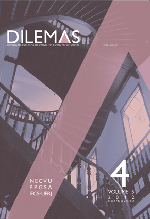A Lei Maria da Penha e a administração judicial de conflitos de gênero: Inovação ou reforço do modelo penal tradicional?
Keywords:
Lei Maria da Penha, violência contra a mulher, administração judicial de conflitos, modelo penal, direitoAbstract
Este trabalho tem como base pesquisa que analisou o tratamento judicial concedido à conflitualidade doméstica e familiar pelo Juizado de Violência Doméstica e Familiar Contra a Mulher de Porto Alegre. Além de identificar as lógicas de tratamento do conflito, os resultados alcançados e a percepção dos agentes jurídicos, buscou-se, a partir de um referencial teórico que trata da crise do modelo jurídico tradicional e da emergência do “Estado Regulativo”, esclarecer até que ponto estamos diante de um novo modelo de enfrentamento da violência contra a mulher, voltado para a prevenção e a superação do conflito, ou de uma opção pela extensão, antecipação e reforço punitivo.
The ‘Maria da Penha Law' and the Judicial Treatment of Gender Conflicts: Innovation Or Reinforcement of the Traditional Penal Model? is based on research that investigated the judicial treatment of domestic and family conflicts by the Court for Domestic and Family Violence Against Women of Porto Alegre, Brazil. As well as identifyÂing the logic behind the treatment, the results achieved and the perception of the court agents, a theoretical base was explored to understand the crisis of the traditional leÂgal model and the emergence of the “Regulator State”, and to elucidate the extent to which we are faced with a new model for tackling violence against women, geared toward preventing and overcoming conflict, or with the option of punitive reinforcement, extension and anticipation.
Keywords: Maria da Penha Law, violence against women, judicial treatment of conflicts, penal model, law
Downloads
Published
Issue
Section
License
Upon submitting a text, the authors retain copyright and grant DILEMAS - Revista de Estudos de Conflito e Controle Social the right of first publication, with the work simultaneously licensed under the Creative Commons License type attribution BY (CC-BY), which permits sharing of the work with acknowledgment of authorship and initial publication in this journal.

